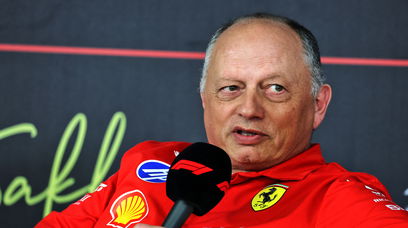Arguably the worst-kept secret of the season to date has been Audi's much-mooted acquisition of Sauber Motorsport, with Wednesday's announcement that the Four Rings had entered into a 'strategic partnership' with the Swiss company being just start of what will be a staggered process, with an initial 50% and further 25% scheduled to change hands in 2023/4 respectively. What happens to the remaining shares is, at this stage, unconfirmed, given that chairman (and majority shareholder) Finn Rausing - scion of the Tetrapak-founding family - is said to be keen to retain a slice of the team. Thus, the final quarter could be acquired by Audi, be split between the two parties or retained by the Swede. Who knows – Rausing may well sell to a third party; time alone will tell. True, today's announcement makes only passing mentions of 'Audi planning to acquire a stake'; sources within the team are adamant that a heads of agreement deal has been signed but is contingent upon Audi – a wholly-owned subsidiary of the listed VW Group, remember - obtaining all regulatory approvals. Such activities take time, particularly where cross-border formalities are involved. That Audi would settle for Sauber is no surprise, for they have long cooperated on sports and saloon car racing projects. Indeed, on the two occasions I visited Sauber's base in Hinwil during the past five years, various German-plated Audis were dotted about outside; during an earlier visit I was 'banned' from the wind tunnel as a customer was aero testing. Coincidentally, Audi Sport vans with closed trailers were parked in the street. Then, Technical Director Jan Monchaux was recruited from Audi as Head of Aero in 2018 after time was called on the Four Rings' WEC programme. He had performed similar activities for Sauber until promotion to his current role a year later. Add in that Hinwil is situated in the Swiss-German canton, and clearly a number of sporting and cultural fits exist, particularly as Audi's motorsport base in Neuburg is but a three-hour drive away.
Why Audi's F1 operation means business
The scale of Audi's ambitions became clear when RacingNews365 visited Neuburg in mid-September as the first international publication to be shown the nascent F1 facility. With it being increasingly unlikely that Porsche will enter F1 after splitting with Red Bull and missing the FIA's 2026 power unit entry deadline of 15 October, the full weight of VW Group's F1 ambitions now rest on Audi's shoulders. However, the word is that the Porsche brand could still be seen in F1 , but on rebadged Audi power units. While such a move makes perfect commercial sense - particularly as the respective Audi and Porsche road car divisions share a number major components, including powertrains – it would turn Porsche into a secondary partner in any such venture. Imagine the corporate politics… When Audi announced its entry as engine supplier during the Belgian Grand Prix weekend at end-August, no mention was made of acquiring a stake in a team – indeed, the questions were neatly sidestepped – but, as outlined here in January, it is a logical step as Audi was granted permission by the VW board to enter F1 provided the project is a 'profit centre' and not a drain on company resources. The only way Audi could meet its mandate is as team owner given that engine suppliers don't qualify for prize monies, nor do they generate meaningful sponsorship revenues. That said, under prevailing agreements F1 newcomers are liable for $200m 'anti-dilution' fees, and while F1 indicated it would waive the charge for Audi, this would open a legal can of worms given that no such concessions were promised to Michael Andretti's proposed entry.
Discussions with other F1 teams
Against this background, the acquisition of a team was a must, and thus Audi opened discussion with all usual suspects: AlphaTauri, McLaren, Sauber and Williams. First named proved too disparate, having Austrian ownership yet being based in Italy and having a wind tunnel and aero department working out of the UK; in McLaren's case the auto division got in the way, while Williams suffers all Brexit's disadvantages. That left Sauber, crucially a team that has run race cars for manufacturers – think back to its early-90s links with Mercedes, then the BMW deal and now with Alfa Romeo, the latter a deal that puts the brand on the track in F1 at a bargain basement price. However, Alfa Romeo has already announced its split with Sauber effective end-2023, but is keen on further reaping the benefits provided by F1 by remaining on the grid, but not with Audi. The word in Austin was that Alfa Romeo could transfer to Haas from 2023– logical given their shared Ferrari powertrains, while Alfa Romeo and new-for-2023 title sponsor Moneygram share the same red/white/black colours. It's a long shot, but if it happens, remember where you read about Alfa Romeo Moneygram Haas F1 Team first. An unwieldy title, but no more so than Aston Martin Aramco Cognizant F1 Team. For now, though, the focus is very much on Audi and not on other team names; the primary focus being on how Audi will ramp up Hinwil to ensure its campaign does not go the way of the last manufacturer to enter F1 in its own right – Toyota, which after ten years had little to show for its billion-dollar spend, save for a few podiums. To date, Audi has made all the right noises and done all the right things. From our discussions in Neuburg it is clear that Audi has not underestimated the scale of the numerous tasks ahead. All building blocks are now in place, with 'acquiring a shareholding in Sauber' being but a further step in that direction for Audi. Audi Sport vans and trailers are likely to be an increasingly common sight in Wildbachstrasse 9, Hinwil
Most read






